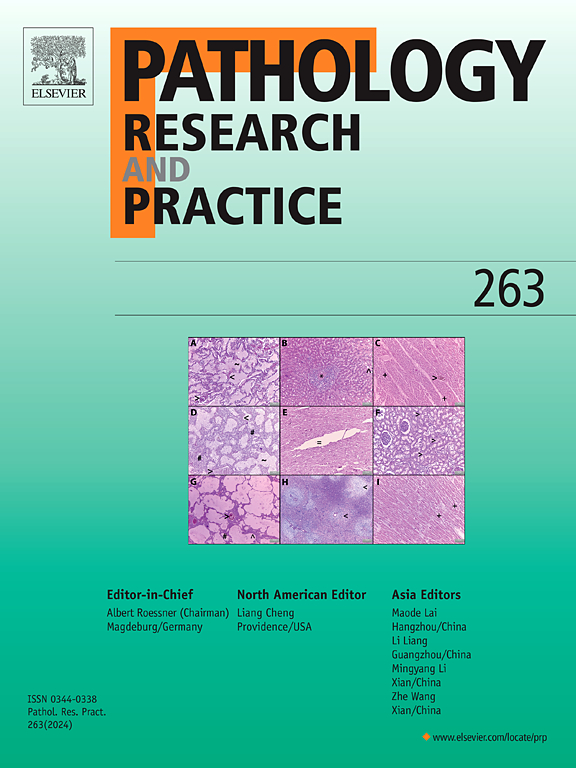浸润性自然杀伤细胞影响卡介苗免疫治疗非肌浸润性膀胱癌的疗效
IF 2.9
4区 医学
Q2 PATHOLOGY
引用次数: 0
摘要
非肌肉侵袭性膀胱癌(NMIBC)由局限于膀胱尿路上皮或固有层的肿瘤组成,不侵犯肌肉层。膀胱内卡介苗(Bacillus calmette - gusamrin)被广泛用作中高风险NMIBC患者的辅助治疗。然而,这些患者中有很大一部分对卡介苗无效或治疗后复发。此外,尽管卡介苗已经使用了几十年,但仍然没有临床验证的生物标志物能够预测哪些患者将从这种治疗中受益。越来越多的证据表明,肿瘤免疫微环境影响卡介苗免疫治疗的效果。在这种背景下,我们的研究旨在评估,通过免疫组织化学,免疫细胞亚种群的丰度是否——自然杀伤(NK)细胞,肿瘤相关巨噬细胞(tam) CD4 + T, CD8 + T和FOXP3 + 调节性T (Treg)细胞或T细胞比率(CD4 + / CD8 + FOXP3 + / CD8 +)——在NMIBC尿道上皮,波士顿咨询公司之前,与BCG有关反应率(RR)和recurrence-free生存(RFS)治疗后。我们证明,预处理后NMIBC尿路上皮中较高的NK细胞计数与卡介苗免疫治疗后卡介苗RR的改善和RFS的延长显著相关。我们假设这些结果与BCG诱导的训练免疫有关,这被认为是BCG免疫治疗膀胱癌疗效的关键。一旦在未来的研究中得到验证和进一步研究,我们的发现可能有助于改善NMIBC患者的分层和治疗。本文章由计算机程序翻译,如有差异,请以英文原文为准。
Infiltrating Natural Killer cells influence the efficacy of BCG immunotherapy in non-muscle-invasive bladder cancer
Non-muscle-invasive bladder cancer (NMIBC) consists of tumors restricted to the bladder urothelium or lamina propria, without invasion of the muscular layer. Intravesical BCG (Bacillus Calmette-Guérin) is widely used as an adjuvant therapy for patients with intermediate or high-risk NMIBC. However, a significant proportion of these patients fail to respond to BCG or recur after treatment. Moreover, despite decades of BCG usage, there are still no clinically validated biomarkers capable of predicting which patients will benefit from this treatment. Emerging evidence suggests that the tumor immune microenvironment influences the efficacy of BCG immunotherapy. In this context, our study aimed to assess, by immunohistochemistry, whether the abundance of immune cell subpopulations – Natural Killer (NK) cells, tumor-associated macrophages (TAMs), CD4 + T, CD8 + T, and FOXP3 + regulatory T (Treg) cells, or T cell ratios (CD4 +/CD8 + and FOXP3 +/CD8 +) – in NMIBC urothelium, prior to BCG, were associated with BCG response rate (RR) and recurrence-free survival (RFS) after treatment. We demonstrated that higher pretreatment NK cell count in the NMIBC urothelium is significantly associated with improved BCG RR and prolonged RFS after BCG immunotherapy. We hypothesize these results are associated with BCG-induced trained immunity, which has been proposed to be essential for the efficacy of BCG immunotherapy in bladder cancer. Once validated and further investigated by future studies, our findings may help to improve the stratification and treatment of patients with NMIBC.
求助全文
通过发布文献求助,成功后即可免费获取论文全文。
去求助
来源期刊
CiteScore
5.00
自引率
3.60%
发文量
405
审稿时长
24 days
期刊介绍:
Pathology, Research and Practice provides accessible coverage of the most recent developments across the entire field of pathology: Reviews focus on recent progress in pathology, while Comments look at interesting current problems and at hypotheses for future developments in pathology. Original Papers present novel findings on all aspects of general, anatomic and molecular pathology. Rapid Communications inform readers on preliminary findings that may be relevant for further studies and need to be communicated quickly. Teaching Cases look at new aspects or special diagnostic problems of diseases and at case reports relevant for the pathologist''s practice.

 求助内容:
求助内容: 应助结果提醒方式:
应助结果提醒方式:


